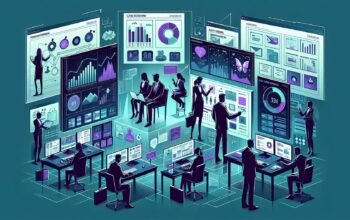You scroll through LinkedIn and everyone seems fine. Happy. Thriving. Crushing it.
Meanwhile, you’re sitting in your apartment at 2 AM, anxiety crushing your chest, wondering if you’re the only one who feels this way. Wondering if everyone else has it figured out and you’re just… broken.
But here’s the truth nobody posts about: thousands of developers are sitting in their own apartments at 2 AM feeling exactly the same way. They’re just not talking about it on LinkedIn.
Finding your tech tribe, people who actually understand what it’s like to work in this industry and struggle with mental health, isn’t just nice to have. It’s essential for survival.
Let me show you where to find these people.
Why developer communities matter for mental health
Research shows that online mental health communities provide psychological safety, reduce isolation, normalize mental health experiences, and improve mental health self-efficacy. When you connect with people who get it, who’ve been through it, who understand the specific hell of debugging production issues while having a panic attack, everything changes.
You realize you’re not broken. You’re not weak. You’re human, and you’re dealing with a uniquely challenging career in an industry that often ignores mental health.
Online communities where developers gather
Let’s start with the digital spaces where you can connect with other developers struggling with mental health.
Open Sourcing Mental Illness (OSMI)
OSMI is probably the most well-known organization focused specifically on mental health in tech. They run forums, organize talks at conferences, conduct research, and create resources for both individuals and companies.
Their community includes developers who openly discuss their mental health challenges, share coping strategies, and advocate for better mental health support in tech workplaces. They fight stigma by speaking openly about mental illness in a way that’s straightforward and honest.
Website: osmihelp.org
Reddit communities
Reddit has several active communities where developers discuss mental health. Some of the best include:
- r/cscareerquestions – Career advice with frequent mental health discussions
- r/ExperiencedDevs – For senior developers, often discusses burnout and work-life balance
- r/ProgrammerHumor – Humor that often touches on the stress of development
- r/mentalhealth – General mental health support with many tech workers
- r/ADHD – Huge community, many developers with ADHD
- r/depression and r/anxiety – General support with active tech worker participation
The anonymity of Reddit makes it easier to share honestly without worrying about professional repercussions.
Discord servers
Discord has become a hub for developer communities, and many servers have mental health channels. Some popular options include:
- The Programmer’s Hangout – Large community with mental health support channels
- Coding Den – Supportive community for developers at all levels
- Dev Café – Social space for developers to decompress
Discord communities offer real-time chat, voice channels for deeper conversations, and the ability to build ongoing relationships with the same people over time.
Specialized mental health forums
These aren’t tech-specific but have large tech worker populations:
- Mental Health Forum (mentalhealthforum.net) – Safe, moderated community for various mental health issues
- My Support Forums (mysupportforums.org) – Originally Psych Central Forums, now independent peer support
- 7 Cups – Pairs you with trained listeners for anonymous support
Slack communities
Many tech communities have Slack workspaces with mental health channels. Some are invite-only, but worth seeking out through tech meetups or conference connections.
Offline communities and meetups
Digital connection is valuable, but in-person community offers something different. The physical presence of other humans who get it can be incredibly grounding.
Local developer meetups
Most cities have regular developer meetups. While they’re ostensibly about tech, the social connections matter just as much. Find meetups through Meetup.com, Eventbrite, or local tech company event pages.
Don’t just attend for the talks. Stick around for the informal conversations afterward. That’s where real connections happen.
Tech conferences
Conferences aren’t just for learning new frameworks. They’re for meeting people who share your struggles. Many conferences now have mental health tracks or informal mental health gatherings.
OSMI often has a presence at major tech conferences, making it easier to connect with others interested in mental health in tech.
Coworking spaces
If you work remotely, coworking spaces can combat isolation. Even if you don’t interact much with others, the presence of other humans working can be comforting.
Some coworking spaces specifically cater to tech workers and have built-in communities.
In-person support groups
Look for mental health support groups in your area through NAMI (National Alliance on Mental Illness), local mental health centers, hospitals, or community centers. While not tech-specific, connecting with others dealing with similar mental health issues can be valuable.
How to engage without burning out
Community is healing, but it can also be draining. Here’s how to engage sustainably.
graph TD
A[Join Community] --> B[Start as Observer]
B --> C[Lurk and Read]
C --> D{Feel Ready?}
D -->|Not Yet| C
D -->|Yes| E[Share Your Story]
E --> F[Engage in Discussions]
F --> G[Build Connections]
G --> H{Feeling Overwhelmed?}
H -->|Yes| I[Take a Break]
I --> J[Self-Care Period]
J --> K{Ready to Return?}
K -->|No| J
K -->|Yes| F
H -->|No| L[Maintain Healthy Boundaries]
L --> M[Balance Giving & Receiving]
M --> F
F --> N[Long-term Community Member]
style A fill:#e1f5ff
style H fill:#fff4e1
style N fill:#e8f5e9
style I fill:#ffe1e1Start as a lurker
You don’t have to jump in immediately. Spend time reading, observing, getting a feel for the community culture. See if it feels safe. Notice if the conversations resonate with you.
Lurking isn’t weakness. It’s smart boundary-setting.
Share at your own pace
You don’t owe anyone your story. Share what feels comfortable. You can start small with “I’ve been struggling with burnout lately, anyone else?” before diving into deeper vulnerabilities.
Set boundaries around availability
Online communities can feel obligatory, especially if you’re active. But you don’t have to respond to every post. You don’t have to be available 24/7. You don’t have to solve everyone else’s problems.
Mute notifications if needed. Take breaks. Protect your energy.
Balance giving and receiving support
Supporting others is valuable, but if you’re only giving and never receiving, you’ll burn out. It’s okay to be the one who needs help. That’s why the community exists.
Know when to step back
If a community starts feeling toxic, draining, or triggering, leave. Not all communities are healthy. Not all communities are right for you. It’s okay to walk away.
Red flags in online communities
Not all communities are safe or helpful. Watch for these warning signs:
- Members discouraging professional help or promoting only alternative treatments
- Toxic positivity where negative feelings are dismissed
- Competitive suffering where people try to prove who has it worse
- Lack of moderation allowing harassment or harmful content
- Communities that feel more triggering than supportive
- Advice that contradicts medical guidance without appropriate disclaimers
Good communities welcome diverse experiences, support professional treatment, have clear moderation, and feel safe even when discussing difficult topics.
Building deeper connections
Large communities are great for finding people, but deeper connections happen in smaller groups or one-on-one relationships.
Move from public to private conversations
When you connect with someone in a larger community, consider moving to DMs or video calls. Deeper friendship requires more intimate space than public forums allow.
Form or join smaller accountability groups
Small groups of 3-5 people meeting regularly (even virtually) can provide consistent support. You might form a weekly check-in group, a coding accountability group that also discusses mental health, or a peer support circle.
Meet up in real life when possible
If you connect with someone online who lives nearby, consider meeting for coffee. The transition from digital to in-person friendship can be awkward, but it’s worth it.
When community isn’t enough
Community is powerful, but it’s not a substitute for professional help. Peer support can’t diagnose conditions, prescribe medication, provide structured therapy, or handle crisis situations.
If you’re in crisis, dealing with severe symptoms, or not improving with peer support alone, seek professional help. Community complements therapy; it doesn’t replace it.
Starting your own community
If you can’t find a community that fits your needs, consider starting one. Maybe it’s a Slack channel at your company for mental health discussions, a local meetup for developers with ADHD, or a Discord server for your specific tech niche.
Starting a community takes effort, but it also ensures you create the safe space you wish existed.
Your tribe is out there
You are not the only developer struggling with mental health. Not even close. For every person talking about it openly, there are dozens suffering silently, thinking they’re alone.
Finding your tech tribe means you stop carrying everything alone. You have people who understand when you say “I’m burned out” or “The imposter syndrome is crushing me today” or “I can’t focus and I don’t know why.”
They don’t judge. They don’t offer empty platitudes. They say “Yeah, me too” or “Here’s what helped me” or simply “That really sucks, I’m sorry.”
Start somewhere. Pick one community from this list. Join. Lurk for a while. When you’re ready, share something small. See what happens.
Your tribe is out there, waiting for you to find them. And they need you as much as you need them.
References
- JMIR Mental Health: “Understanding the Impacts of Online Mental Health Peer Support Forums” – https://mental.jmir.org/2024/1/e55750
- Open Sourcing Mental Illness (OSMI) – https://osmihelp.org/
- Mental Health Forum – https://www.mentalhealthforum.net/
- My Support Forums – https://mysupportforums.org/
- VITA Daily: “The Role Of Online Communities In Mental Wellness & Support” – https://vitamagazine.com/2024/09/24/the-role-of-online-communities-in-mental-wellness-support/







